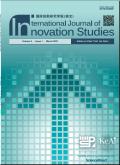数字化转型与创新和商业生态系统:生态系统创新的概念见解与合作实践的文献计量分析
IF 5.3
Q2 MANAGEMENT
引用次数: 0
摘要
本研究旨在通过回顾最新的研究,为可持续创新提供一种生态系统启发的数字化转型(DT)方法。关注可持续发展目标(sdg)的数字技术创新路径,因此可以根据绿色数字转型中创新和政策进展的“螺旋”模型的进展,根据研究结果制定包含各种生态系统概念的数字技术创新路线图。按照系统评价和荟萃分析首选报告项目(PRISMA)协议,在Web of Science (WoS)数据库中进行书目检索。然后进行文献计量分析,得出各种科学制图结果。研究结果为旨在实现可持续发展目标的利益相关者提供了实用的数字化创新路径,并为研究人员提供了数字化创新路线图,以帮助他们在不断变化的创新格局中导航。自2007年以来,特别是2018年之后,在中国、澳大利亚、英国、意大利等国家以及广州南方学院、科廷大学、哈佛大学等附属院校的积极贡献下,研究成果快速增长。研究结果包括绩效概述、概念和主题的一组聚类分析、概念和知识结构以及可持续发展目标识别表,为拟议的绿色数字转型(GDT)创新路线图和DT创新路径提供了基础。本研究首次对以创新和商业生态系统为重点的DT文献进行了文献计量分析和科学制图。拟议的GDT创新路线图概述了“生态系统创新”概念的实用性,整合了自然生态系统、生态系统服务、生态系统经济、商业生态系统、创新生态系统和数字生态系统,从而要求生态设计DT战略,促进跨部门和学科的协调和伙伴关系。本文章由计算机程序翻译,如有差异,请以英文原文为准。
Digital transformation and innovation and business ecosystems: A bibliometric analysis for conceptual insights and collaborative practices for ecosystem innovation
This research aims to provide an ecosystem-inspired approach to digital transformation (DT) for sustainable innovations by reviewing state-of-the-art research. Focusing on DT innovation pathways for Sustainable Development Goals (SDGs), a DT innovation roadmap incorporating various notions of ecosystems can thus be developed based on the findings in response to advancements in the “Helix” models of innovation and policy progress in green digital transformation.
Following the Preferred Reporting Items for Systematic Reviews and Meta-Analyses (PRISMA) protocol, a bibliographic search was conducted in the Web of Science (WoS) database. A bibliometric analysis was then performed, leading to various science mapping outcomes. The research findings suggest practical DT innovation pathways for stakeholders aiming to achieve SDGs and a DT innovation roadmap to assist researchers in navigating the evolving innovation landscape.
Since 2007, research output has experienced rapid growth, especially after 2018, with active contributions from countries such as China, Australia, England, and Italy, as well as affiliations such as Guangzhou Nanfang College, Curtin University, and Harvard University. The findings, including a performance overview, a set of clustering analyses of concepts and themes, the conceptual and intellectual structure, and an SDG identification table, provide the basis for the proposed Green Digital Transformation (GDT) innovation roadmap with DT innovation pathways.
This research is the first to conduct a bibliometric analysis and science mapping of the DT literature focusing on innovation and business ecosystems. The proposed GDT innovation roadmap outlines the usefulness of the concept of “ecosystem innovation,” integrating the natural ecosystem, ecosystem services, ecosystem economy, business ecosystem, innovation ecosystem, and digital ecosystems, thereby calling for the eco-design of DT strategies that foster alignment and partnership across sectors and disciplines.
求助全文
通过发布文献求助,成功后即可免费获取论文全文。
去求助
来源期刊

International Journal of Innovation Studies
Business, Management and Accounting-Strategy and Management
CiteScore
8.10
自引率
0.00%
发文量
23
审稿时长
19 weeks
 求助内容:
求助内容: 应助结果提醒方式:
应助结果提醒方式:


